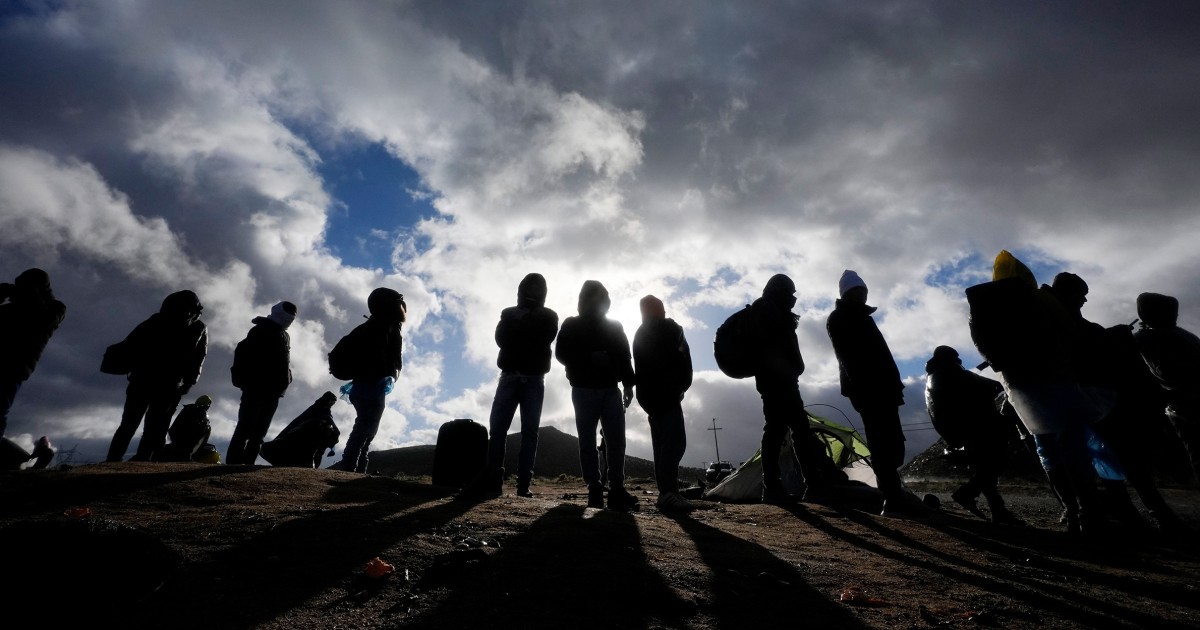In America, Becky Harris had heard of the immigrant drama.
In Spain, it has suffered.
This young woman from Indianapolis has understood what it means to be one of them by sharing a queue outdoors in Madrid with foreigners from Africa, Asia and Latin America in front of a police station where shouting, orders and the rough treatment of the agents are common.
Like many of them, it has been left undocumented because of the collapse of the Spanish administration.
Like them, she has felt unprotected by a system where dark characters that many associate with the mafias offer appointments for procedures for up to 450 euros.
“The truth is that I had no empathy with immigrants until I moved here,” confesses Harris, 26.
It comes from the interior of the United States, the area of the country where Donald Trump devastates.
In the US she studied journalism and in Spain she has been working for three years as an assistant in bilingual schools in the Community of Madrid.
This Thursday he was queuing at the Aluche Brigade, a police complex south of the capital where "all foreigners have nightmares."
The reason for his visit was that he wants to travel to the US to meet his parents at Christmas, but he needs to request a permit to return to Spain because his Foreigner Identification Card (TIE) has expired.
He requested it in August but has not yet received the new one because only a few dozen officials in Madrid assist hundreds of thousands of immigrants.
The pandemic has exacerbated the traffic jam and your TIE is likely to arrive next year.
Without the return permit, he could not enter after Christmas in Spain to rejoin his school.
She has refused to pay one of the many foreign dating merchants.
Their phone numbers circulate in WhatsApp and Telegram groups where foreigners in Madrid share their despair.
Harris has gotten his date "luckily".
He spent weeks refreshing the government page until an available shift appeared.
“At this time there are no appointments available.
Shortly, the Office will make new appointments available to you ”.
Like this all the time, day and night.
The system is worse than a waiting list because it leaves the applicant in limbo.
It forces him to put his life on pause until, as if by magic, the appointments appear on the web, the Electronic Headquarters of Public Administrations.
Officials upload them to the system at any time, sometimes at dawn.
Suspiciously in Madrid there is a world of dating getters who offer them for prices that vary depending on the desperation of the foreigner.
Police sources deny that there are mafias and assure that the sellers of appointments are people who are dedicated to hunt them on the fly, without police cooperation.
Every foreigner in Spain has to suffer from this traffic jam.
From the millionaires with "golden visa" to the poor man who arrives with what is on.
The stakes are high.
Without the proper documentation, the bank can close your account, the landlord can throw you out of the house and the employer can leave you on the street.
Harris stresses that their situation is not nearly as dramatic as that of many tailmates.
She is one of the more than 2,000 conversation aides in schools in Madrid, a group of young Anglo-Saxons that has grown in recent years in demand by the bilingual education system.
"At least we know that they are not going to kick us out of the country, but imagine those who are waiting for asylum," he says.
She speaks wonders of Spain and is grateful to its people, but sometimes she considers leaving.
Being an immigrant, having fewer rights, and seeing your life get stuck seems like too high a price.
This Thursday he had not yet been able to buy his flight to the US because he wanted to wait to have his return permit in hand.
“I love Spain and my life here, but every time I have to do something in immigration matters, it makes me want to go back to the US.
I wonder, is this worth it? "
The conversation assistants in Madrid have a group with more than 21,000 members on Facebook, where they have shared their bad experiences with the Spanish immigration system.
Many have paid for appointments for procedures like fingerprinting or to request a temporary return to their country after spending months of screen frustration.
They complain about the mafias and describe dramatic situations.
"I paid a lawyer almost 95 euros to be able to get a return authorization and see my grandmother on her deathbed this summer," says one.
"Institutional racism"
The dating black market dates back to before the pandemic and has been denounced for years by immigration activists and lawyers.
The articles that appeared in the press and the demonstrations have been of little use.
"They want me to be late," criticizes activist Safiya El Aaddam.
He wonders why there is no jam with the DNI if it is supposed to be made of the same plastic as a TIE, the identification of foreigners.
"This is a problem of institutional racism."
This daughter of immigrants created in January a group of more than 100 volunteers (#TeCedoUnaCita) who look for appointments and then give them to immigrants in need.
The Aaddam says they have received more than 6,000 applications and have given more than 1,000 free appointments.
The underlying problem would of course be solved with more officials to manage immigration procedures, but also by reforming a queue design that is sometimes insensitive and cruel.
Two years ago this newspaper published a report on how hundreds of immigrants slept on the street for desperate days because they were not able to initiate a common immigration process among vulnerable foreigners, the asylum application.
The police responded in order of arrival and slammed the door in the face of those who were left out of a small daily quota.
As soon as the article came out and the television cameras arrived, the police changed the system by creating a waiting list.
The agents distributed shifts to everyone and the waiting immigrants were able to go home and wait for shelter.
Since then the system has moved towards digitization, but waiting lists have not become widespread.
The widespread feeling is that whoever does not vote matters less, despite paying taxes and helping to sustain the country.
"Foreigners are always the last in importance," laments Constanza Suárez, president of the Apaem immigration lawyers association.
Rich and poor must go through the same hoop.
"The immigrant with a gold visa also falls into this bag, what usually happens is that many have plugs, like everything else in life," complains immigration lawyer Agustina Llana.
She is used to dealing with multinational clients who have no choice but to suffer like anyone else.
This equalizing experience is a life lesson.
It has made Harris reflect on the roots of his family.
His grandparents came to the United States from England with their newborn father in their arms in 1966. Almost everyone in the United States knows the immigration story of their ancestors and recounts it with pride, but it is more difficult for descendant generations to identify with the newcomer's experience .
"We have always had the idea that we are a country of immigrants," she says, "but you never think what that really is."



/cloudfront-eu-central-1.images.arcpublishing.com/prisa/465AE263VBEDPFXJV5HSYQKDGM.jpg)



/cloudfront-eu-central-1.images.arcpublishing.com/prisa/O645Q5IDLJHDPB6BJQCWLA23HY.jpg)

